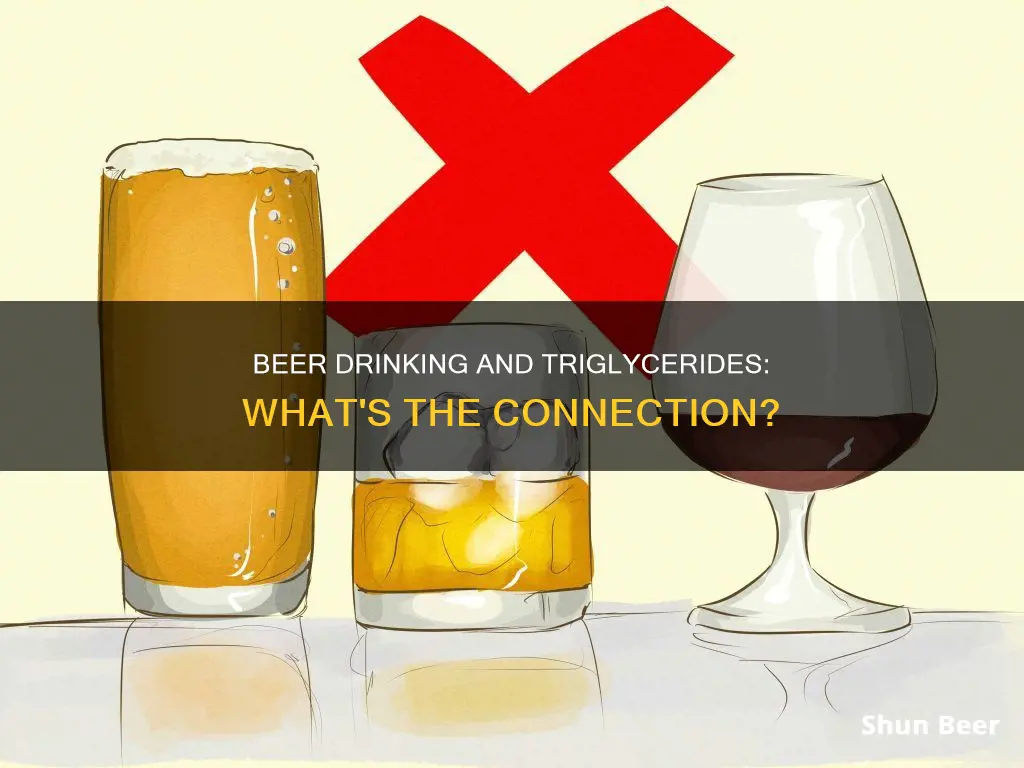
Beer is one of the most popular alcoholic beverages in the world. Drinking beer and other forms of alcohol have health implications. While light to moderate alcohol intake may improve HDL (good) cholesterol, heavy drinking can increase total cholesterol, LDL (bad) cholesterol, and triglycerides. This raises the chance of developing cardiovascular disease. When you drink alcohol, it is broken down and rebuilt into triglycerides and cholesterol in the liver. So, drinking alcohol raises the levels of triglycerides and cholesterol in your blood.
| Characteristics | Values |
|---|---|
| Can drinking beer raise your triglycerides? | Yes, drinking beer can raise your triglycerides. |
| Amount of beer that raises triglycerides | Heavy drinking or binge drinking can increase triglyceride levels. |
| Mechanism | Alcohol is broken down in the liver and reconstructed as triglycerides and cholesterol. |
| Health effects of raised triglycerides | Increased risk of diabetes, pancreatitis, stroke, and heart disease. |
| Recommended alcohol intake | No more than 2 drinks/day for men and 1 drink/day for women. |
| Beer consumption and cholesterol | Beer may increase "good" HDL cholesterol but does not lower "bad" LDL cholesterol. |
| Health effects of beer consumption | Potential benefits include increased HDL cholesterol and reduced risk of heart disease. However, the risks of drinking alcohol, such as increased triglycerides, far outweigh any potential benefits. |
What You'll Learn

Beer and good cholesterol
Beer and cholesterol have a complex relationship. While beer contains no natural cholesterol, it can still impact your cholesterol levels.
Firstly, it's important to understand the different types of cholesterol. There are two types: HDL (high-density lipoprotein) and LDL (low-density lipoprotein), often referred to as "good" and "bad" cholesterol, respectively. HDL helps sweep away LDL cholesterol from your arteries, protecting against heart attacks and coronary artery disease (CAD).
Now, how does beer fit into this? Beer, like all alcoholic drinks, can increase your HDL levels. A 2018 study found that moderate consumption of beer by overweight adults (30 grams of alcohol per day for males and 15 grams per day for females) increased HDL levels after four weeks. This amount of alcohol did not negatively affect liver function or contribute to artery stiffening. However, it's important to note that this increase in HDL was not associated with a decrease in LDL levels, nor did it reduce triglyceride levels.
So, while beer can increase your "good" cholesterol, it does not have a tangible effect on reducing your "bad" cholesterol or triglycerides. This is an important distinction because, while beer may offer some benefits, it does not address all the factors contributing to heart disease risk.
Additionally, it's worth mentioning that excessive alcohol consumption can lead to serious health issues, including heart disease, stroke, high blood pressure, obesity, and an increased risk of certain types of cancer. Therefore, drinking beer should not be seen as a direct method to improve your cholesterol levels or overall health. The potential risks of alcohol consumption generally outweigh the benefits.
If you are concerned about your cholesterol levels, it is recommended to focus on lifestyle changes such as regular exercise, maintaining a healthy weight, and following a balanced diet. These are proven methods to improve your cholesterol levels and overall health.
Hunting Island State Park: Beer Drinking Rules Explained
You may want to see also

Alcohol and heart health
The relationship between alcohol and heart health is a complex one. While some studies have found that drinking alcohol in moderation can have benefits for heart health, these are outweighed by the negative effects of excessive alcohol consumption. It's important to note that the World Health Organization states that "no level of alcohol is safe for our health".
When considering alcohol and heart health, it's crucial to understand the impact of alcohol on cholesterol and triglyceride levels in the blood. Alcohol is broken down and rebuilt into triglycerides and cholesterol in the liver. As a result, drinking alcohol raises the levels of triglycerides and cholesterol in the blood. High levels of triglycerides can build up in the liver, leading to fatty liver disease, which in turn affects the liver's ability to remove cholesterol from the blood, resulting in elevated cholesterol levels. This combination of high triglyceride and low HDL ("good") cholesterol levels can increase the risk of heart disease.
Research has shown that light to moderate alcohol consumption may increase HDL cholesterol levels, which can have a protective effect on heart health. HDL cholesterol helps to sweep cholesterol deposits out of arteries, reducing the risk of coronary artery disease. However, excessive alcohol consumption can lead to higher levels of LDL ("bad") cholesterol and total cholesterol, increasing the risk of cardiovascular disease.
It's important to note that the effects of alcohol on cholesterol and triglyceride levels depend on the amount and frequency of intake. For example, a 2018 study found that moderate consumption of beer (30 grams of alcohol per day for males and 15 grams per day for females) increased HDL levels without negatively impacting liver function or contributing to the stiffening of arteries. On the other hand, excessive drinking can lead to heart muscle disease, irregular heartbeat, and stroke. It can also increase blood pressure and contribute to obesity, further elevating the risk of heart disease.
In conclusion, while light to moderate alcohol consumption may have some beneficial effects on HDL cholesterol levels, the potential risks of excessive alcohol consumption far outweigh these benefits. To maintain optimal heart health, it is crucial to follow a healthy lifestyle that includes a balanced diet, regular exercise, and moderate alcohol consumption, if any.
Is Non-Alcoholic Beer Really Sober Drinking?
You may want to see also

Heavy drinking and health risks
Heavy drinking is associated with a multitude of health risks. While light to moderate alcohol consumption may offer some health benefits, such as raising "good" HDL cholesterol levels, heavy drinking negates these advantages and significantly increases health risks.
When alcohol is consumed, it is broken down and rebuilt into triglycerides and cholesterol in the liver. Excessive alcohol intake leads to higher levels of triglycerides and cholesterol in the blood. High triglyceride levels can cause a build-up in the liver, resulting in fatty liver disease. This, in turn, impairs the liver's ability to function properly and remove cholesterol from the blood, causing cholesterol levels to rise.
Heavy drinking is linked to elevated levels of "bad" LDL cholesterol, total cholesterol, and triglycerides. This combination of high triglyceride and low HDL cholesterol levels increases the risk of heart disease. Additionally, heavy alcohol consumption can contribute to high blood pressure, weight gain, and an increased waist circumference, all of which are risk factors for heart disease.
The negative health consequences of heavy drinking extend beyond heart-related issues. It is a leading risk factor for disease burden worldwide, increasing the likelihood of specific cancers, liver disease, pancreatitis, depression, dependency, and diabetes. The World Health Organization states that "no level of alcohol is safe for our health," and even moderate drinking should be approached with caution.
To maintain optimal health, it is crucial to keep alcohol consumption within recommended limits: no more than two drinks a day for men and one drink a day for women. Heavy drinking is defined as consuming four or more drinks on any given day or more than 14 drinks per week for men, and three or more drinks on any given day or more than seven drinks per week for women.
Amtrak's Beer Policy: Can You Drink While Riding?
You may want to see also

Pros and cons of beer consumption
Beer is one of the most popular alcoholic drinks worldwide, and it has been a part of human culture for thousands of years. It is made by fermenting grain into alcohol, a process that may have begun with the Agricultural Revolution. While some claim that beer has health benefits, others highlight its drawbacks. Here is a balanced overview of the pros and cons of beer consumption.
Pros of Beer Consumption
Beer is rich in various vitamins and minerals, including:
- B vitamins, which may help prevent an alcohol-induced rise in blood homocysteine, a potential risk factor for heart disease.
- Magnesium
- Antioxidants, particularly in darker beers, which may reduce the risk of certain cancers and chronic conditions.
- Brewer's yeast, a nutrient-rich source.
Beer may also have the following health benefits:
- Lower risk of heart disease, with some studies suggesting that moderate beer drinkers have a lower risk of coronary heart disease-related mortality than both heavy drinkers and abstainers.
- Improved blood sugar levels, with light alcohol consumption potentially reducing the risk of developing diabetes.
- Increased bone strength, particularly for men and postmenopausal women, although this benefit sharply drops when consumption exceeds two drinks per day.
- Reduced risk of kidney stones, with Finnish research finding a 40% lower risk among beer drinkers.
- Protection against radiation-induced chromosomal damage, according to Japanese research.
Cons of Beer Consumption
Heavy beer consumption, typically considered to be more than two drinks per day, can lead to:
- Addiction, as alcohol is an addictive substance, and heavy drinking can eliminate most of beer's potential health benefits.
- Reduced life expectancy, with studies showing that heavy drinking can reduce life expectancy by up to 28 years.
- Increased risk of liver disease, specifically fatty liver disease or cirrhosis, when consuming more than two beers per day.
- Weight gain, particularly abdominal obesity in men, commonly known as "beer belly."
- Gastroesophageal reflux and heartburn, as beer contains powerful stimulants of gastric acid secretion.
- Increased blood pressure.
- Intoxication and impairment, even with low amounts, affecting attention, motor skills, and increasing the risk of accidents.
- Dehydration, as the liver needs water to process alcohol, and only 10% of what you drink is removed through urine.
- Hangovers, with symptoms such as throbbing headaches and cotton mouth.
Beer and Excedrin: Safe Mix or Not?
You may want to see also

Alcohol and liver health
Alcoholic liver disease is caused by alcohol abuse, which damages the liver and its function. The liver is one of the most complex organs in the body, serving a wide variety of functions, including filtering toxins from the blood, aiding digestion, regulating blood sugar and cholesterol levels, and helping fight infection and disease. Each time the liver filters alcohol, some of the liver cells die. While the liver is capable of regenerating itself, prolonged alcohol misuse over many years can reduce its ability to regenerate, leading to serious and permanent liver damage.
Alcoholic liver disease typically occurs after years of heavy drinking, with the risk increasing the longer one drinks and the more alcohol consumed. The disease is characterised by scarring and cirrhosis, with cirrhosis being the final phase. While not all heavy drinkers will develop the disease, certain factors can increase the chances of developing it, such as being female, having a pre-existing liver condition, or having a genetic predisposition.
The early symptoms of alcoholic liver disease include poor appetite, weight loss, and small, red spider-like blood vessels on the skin. As the disease progresses and liver function worsens, symptoms may include fluid buildup in the legs (edema) and abdomen (ascites), yellowing of the skin and eyes (jaundice), redness on the palms, easy bruising and abnormal bleeding, confusion or problems with thinking, and pale or clay-coloured stools.
The most effective way to prevent alcoholic liver disease is to abstain from alcohol or stick to the recommended limits. Men and women are advised not to regularly drink more than 14 units of alcohol per week, and it is recommended to spread this out over several days and include alcohol-free days.
While some studies have suggested that low to moderate alcohol consumption may have some health benefits, such as increasing "good" cholesterol levels, the risks of drinking alcohol far outweigh any potential benefits. Excessive alcohol consumption can lead to increased levels of triglycerides in the blood, which can contribute to fatty liver disease. Additionally, alcohol can affect one's health in various ways, including weight gain, increased blood pressure, liver disease, pancreatitis, depression, and dependency. Therefore, it is important to drink in moderation or abstain from alcohol altogether to maintain good liver health.
Root Beer's Soft Drink Status: What's the Verdict?
You may want to see also
Frequently asked questions
Yes, drinking beer can raise your triglycerides. Alcohol is broken down in the liver and reconstructed as cholesterol and triglycerides. The more you drink, the more your levels of cholesterol and triglycerides rise.
Light to moderate alcohol intake may improve HDL (good) cholesterol. However, heavy drinking can increase total cholesterol, LDL (bad) cholesterol, and triglycerides, raising the risk of cardiovascular disease.
Heavy drinking is defined as 4 or more drinks on any given day, or more than 14 drinks per week for males, and 3 or more drinks on any given day, or more than 7 drinks per week for females.
There is evidence that low to moderate consumption of beer may have some health benefits. Beer may increase levels of "good" cholesterol in your blood, known as high-density lipoprotein (HDL). HDL traps and carries "bad" cholesterol to your liver to be broken down and eliminated, thus reducing the risk of heart disease.







